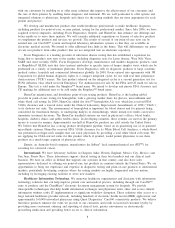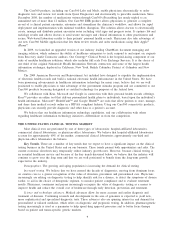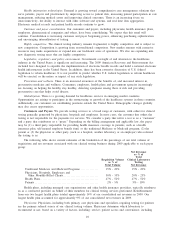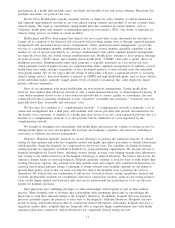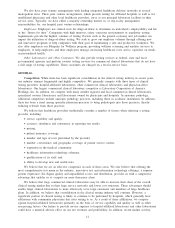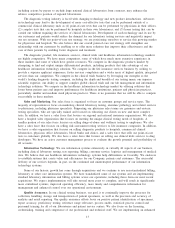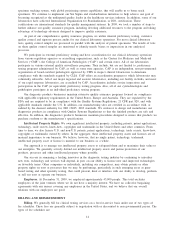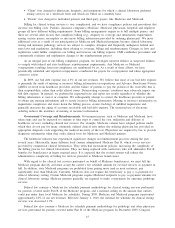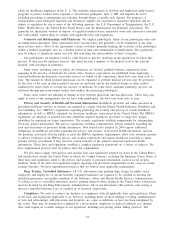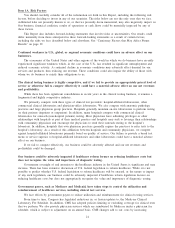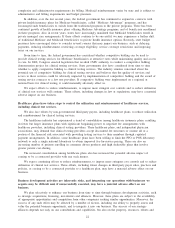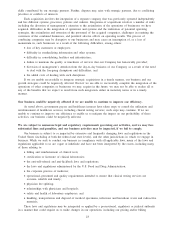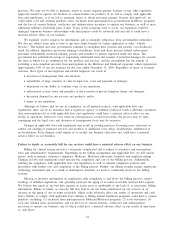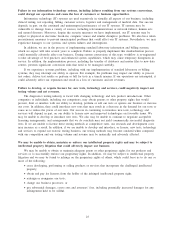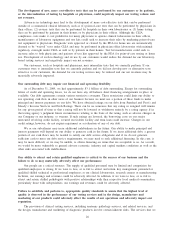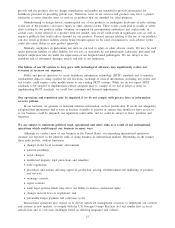Quest Diagnostics 2009 Annual Report Download - page 28
Download and view the complete annual report
Please find page 28 of the 2009 Quest Diagnostics annual report below. You can navigate through the pages in the report by either clicking on the pages listed below, or by using the keyword search tool below to find specific information within the annual report.safety for healthcare employers in the U. S. This includes requirements to develop and implement multi-faceted
programs to protect workers from exposure to blood-borne pathogens, such as HIV and hepatitis B and C,
including preventing or minimizing any exposure through sharps or needle stick injuries. For purposes of
transportation, some biological materials and laboratory supplies are classified as hazardous materials and are
subject to regulation by one or more of the following agencies: the U.S. Department of Transportation, the U.S.
Public Health Service, the United States Postal Service and the International Air Transport Association. We
generally use third-party vendors to dispose of regulated medical waste, hazardous waste and radioactive materials
and contractually require them to comply with applicable laws and regulations.
Contracts and Relationships with Physicians. We employ pathologists. Many of our pathologists enter into
an employment agreement. These agreements have varying terms, but generally can be terminated at any time,
upon advance notice. Most of the agreements contain covenants generally limiting the activities of the pathologist
within a defined geographic area for a limited period of time after termination of employment. The agreements
may be subject to limitations under state law that may limit the enforceability of these covenants.
Our pathologists are required to hold a valid license to practice medicine in the jurisdiction in which they
practice. If they provide inpatient services, they must become a member of the medical staff at the relevant
hospital, with privileges in pathology.
Many states, including some in which our businesses are located, prohibit business corporations from
engaging in the practice of medicine. In certain states, business corporations are prohibited from employing
licensed healthcare professionals to provide services on behalf of the corporation; these laws vary from state to
state. The manner in which licensed physicians can be organized to perform medical services may be governed
by the laws of the state in which medical services are provided and by the medical boards or other entities
authorized by these states to oversee the practice of medicine. In some states, anatomic pathology services are
delivered through physician-owned entities that employ the practicing pathologists.
Some states restrict the splitting or sharing of fees between physicians and non-physicians. These laws may
apply to some of the arrangements that we have with pathologists; the laws vary from state to state.
Privacy and Security of Health and Personal Information. Healthcare providers and others involved in
providing healthcare services to patients are required to comply with the federal Health Insurance Portability and
Accountability Act (“HIPAA”) regulations regarding protecting the security and privacy of certain healthcare
information, as well as HIPAA standards for electronic healthcare transactions in the United States. The HIPAA
regulations on adoption of national provider identifiers required healthcare providers to adopt new, unique
identifiers for reporting on claims transactions. The security regulations establish requirements for safeguarding
electronic patient information. The privacy regulations establish comprehensive federal standards regarding the
uses and disclosures of protected health information. New federal laws adopted in 2009 impose additional
obligations on healthcare providers regarding the privacy and security of protected health information, increase
the penalties associated with the failure to meet the HIPAA regulatory requirements, allow state attorneys general
to enforce violations of the HIPAA privacy and security regulations and require healthcare providers to notify
patients and the government if they discover certain breaches of the patient’s unsecured protected health
information. These laws and regulations establish a complex regulatory framework on a variety of subjects. We
have implemented practices that we believe meet the requirements.
We also must comply with privacy and security laws and regulations adopted by states in the United States
and jurisdictions outside the United States in which we conduct business, including the European Union. Some of
these laws and regulations relate to the privacy and security of personal information, such as social security
numbers. Some of the laws and regulations impose reporting and disclosure requirements in the event of certain
security breaches. We have implemented practices that we believe meet applicable requirements.
Drug Testing; Controlled Substances. All U.S. laboratories that perform drug testing for public sector
employees and employees of certain federally regulated businesses are required to be certified as meeting the
detailed performance and quality standards of the Substance Abuse and Mental Health Services Administration.
To obtain access to controlled substances used to perform drugs-of-abuse testing in the United States, laboratories
must be licensed by the Drug Enforcement Administration. All of our laboratories that perform such testing or
that use controlled substances are so certified or so licensed, respectively.
Compliance. We seek to conduct our business in compliance with all applicable laws and regulations. Many
of the laws and regulations applicable to us, however, including many of those relating to billing, reimbursement
of tests and relationships with physicians and hospitals, are vague or indefinite or have not been interpreted by
the courts. They may be interpreted or applied by a prosecutorial, regulatory or judicial authority in a manner
that could require us to make changes in our operations, including our pricing and/or billing practices. The
18


